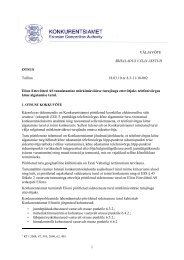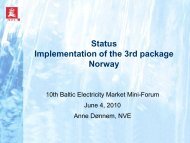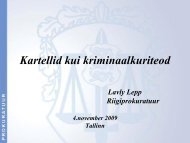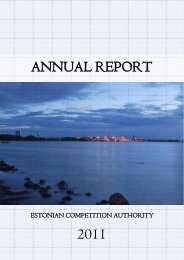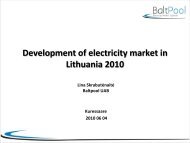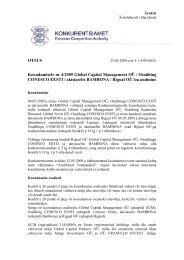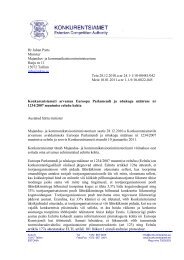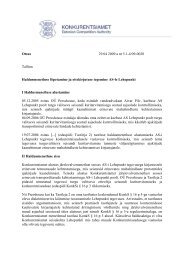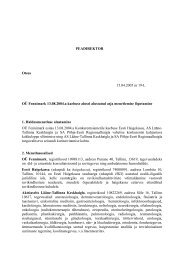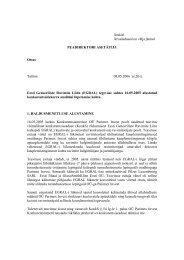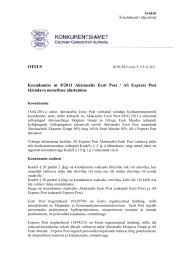ANNUAL REPORT 2010 - Konkurentsiamet
ANNUAL REPORT 2010 - Konkurentsiamet
ANNUAL REPORT 2010 - Konkurentsiamet
You also want an ePaper? Increase the reach of your titles
YUMPU automatically turns print PDFs into web optimized ePapers that Google loves.
Competition Authority as an independent regulator was necessary. An essential<br />
development compared to the former situation takes place in the procedural stage. While in<br />
the past the local government established the price with its regulation, then according to the<br />
new act the price of a water service shall be established by the water operator, who shall be<br />
completely responsible for the compliance of the price with legal requirements. Before the<br />
price takes force, he shall obtain the approval of a competent regulator, i.e. the Competition<br />
Authority in case of approximately 70 major water operators and local government in case<br />
of smaller operators. The amendment to KKütS also brings under the regulation of the<br />
Competition Authority all smaller heat operators, whose price limit was formerly approved<br />
by the local government. In addition to the preliminary control, the new act entitles the<br />
Competition Authority to control the prices of the water service and subscription fees<br />
through supervision.<br />
In the past, when the prices of water services were established by the local governments,<br />
there was no possibility to ensure the legality of price formation with the means of<br />
competition supervision. Price formation of a water operator could be analysed on the basis<br />
of the Competition Act, but price regulations of local governments remained valid anyway.<br />
Regulations can be disputed in the constitutional review proceedings, which is outside the<br />
competence of the Competition Authority. In case of AS Tallinna Vesi, the Competition<br />
Authority submitted its economic analysis to the Chancellor of Justice. The latter took it<br />
forward to the Supreme Court, which assumed the opinion that the regulation was a general<br />
order, while disputing it is also outside the competence of the Chancellor of Justice. Thus<br />
the former practice of administrative courts, where price regulations had been treated as<br />
regulations and therefore did not proceed, was considered wrong. In conclusion the problem<br />
is fortunately rather theoretical, as the indicated weakness in the supervision system was<br />
corrected with MHKS, according to which prices are not established with an act of public<br />
authority, but by the water operator himself. Before implementation of the price the water<br />
operator shall obtain approval for the price, which shall be effected as a resolution of the<br />
regulator. The new act is undoubtedly a major step forward towards an operative and<br />
transparent economic regulation, even if it will not bring along the expected decrease of<br />
prices immediately. The regulation will start to function proactively and some disputed<br />
issues shall be first clarified, before starting to take extreme coercive measures such as an<br />
establishment of temporary prices, etc.<br />
13




